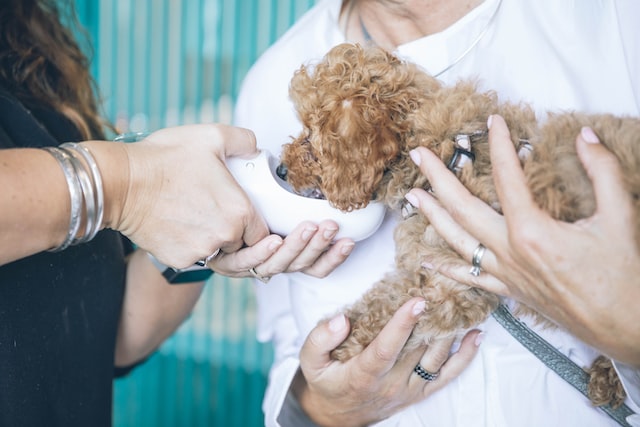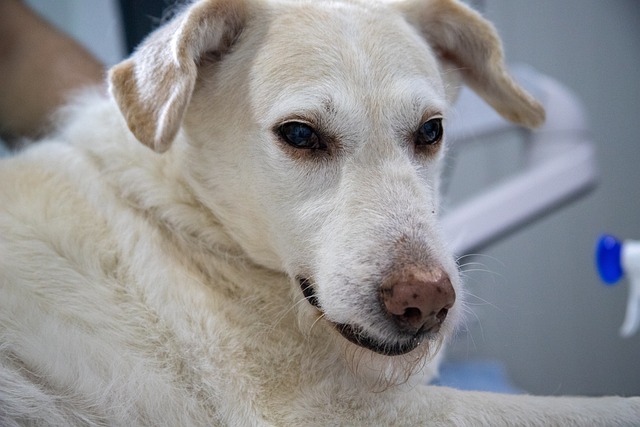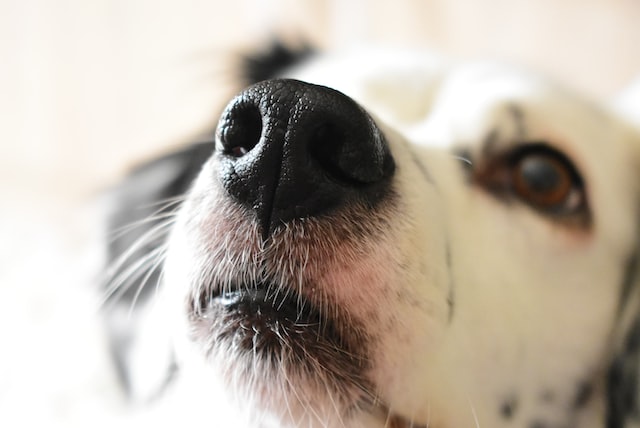Canine Respiratory Disorders – Breathing Problems, Nasal Discharge or Gagging
Respiratory disorders in your dog can be alarming at times and they should be treated as a potential problem. As I always tend to say, your dog can not tell you when something is wrong. Having breathing problems is a sign that something is not right and should be treated as such.
Sneezing / Nasal Discharge
Table of Contents

Sneezing is not uncommon in dogs. They often sneeze when they wake up, or at other times like if they are laying on their backs. However, an allergic sneeze is different from an infectious sneeze. The infectious sneeze will often cause puss. If you notice blood coming from one of your dogs nostrils this could be a sign of a tumor or a foreign object lodged in his nasal cavity.
If your dog is displaying any symptoms other than the normal sneezing you should consult with your veterinarian right away to find out what the problem really is. Allergic sneezing can be treated by removing the cause of the allergy or by antihistamines. If it is an infection that is causing the sneezing your vet can give you the proper medications to treat the infection. In the worst case if there is a tumor your vet will likely need to operate, while if it a foreign object it can be removed once it has moved forward enough in the nasal passage to be easily reached.
Abnormal Breathing

If you notice that your dog is showing some abnormal breathing you should act quickly. If the breathing is distresses or unusual it can signal a life threatening situation or a major issue with your dog’s health. Coughing blood or a puss discharge along with a lack of energy is also something that should be looked into without delay. Last but not least shallow or rapid breathing can also be a sign of a serious problem.
If your dog is displaying any of these breathing problems then your veterinarian should be consulted right away. This is not something that should be delayed just because no physical injury is obvious. The fact that your dog is having trouble is evident by his breathing so make sure that you take care of it immediately.
Coughing or Gagging
This could be caused by a heart problem, a windpipe that is collapsed, bronchitis or perhaps even a parasite. If fluid is building up in your dog’s lungs this could cause it to gag. Typically the coughing or gagging gets worse with time and may be more noticeable after exercise.
If your dog is having problems then you should seek a veterinarian’s advice immediately. He may have to help the dog to breathe by inserting an artificial windpipe, with medication or with surgery. If the coughing is heart related and you are able to improve his cardiac function then this should relieve the coughing.
Canine Respiratory Disorders – Coughing, Snoring and Voice Changing

If you are dealing with a respiratory disorder, or if you can talk to someone who suffers from one then you know that it is not a fun thing to endure. Your dog is unable to tell you when he has a problem but if you notice some of these things in your dog hopefully this article will help you to better deal with it.
Acute Coughing: This is different from a persistent coughing problem, and it is a sign (generally speaking) of something less serious but it could be important to note the situation regardless. Acute coughing can be a sign of kennel cough, bronchitis, pneumonia or even something foreign in the airway. It could also signal some form of infection that needs attention. Kennel cough if passed on from dog to dog (like a cold) and causes an inflammation in the voice box. Bronchitis is a bacterial or allergic inflammation of the bronchi that are located in the lungs.
If your dog has Kennel cough you should make sure to keep him away from other dogs as it is highly contagious and the other dogs could end up with the same disease. Take him to the veterinarian immediately for treatment (call ahead to make sure of a good time to come in when other dogs are not present). The vet can give him cough suppressants to ease the discomfort of the illness. Medications will also be given to help treat any of the illnesses that we discussed. Of course if a foreign object is lodged in your dog’s throat this is a serious situation and should be treated by a veterinarian right away. He should be able to remove the object with forceps.
If snoring is a problem (in your dog, not your husband) this can come from something that is breed specific. Some breeds have elongated soft palates that are hanging in the backs of their throats and they can cause a partial blockage of the larynx which in turn makes the dog snore. It can also be cause by an allergic inflammation in the dog’s throat, this would cause the dog to snore and the snoring could be worse if the dog happens to have narrow nostrils.
Snoring in itself generally does not signify a serious issue but if it is a problem it is always best to ask your veterinarian for his opinion. In the worst case, in some breeds, it could signify a heart or breathing problem which would need to be addressed immediately.
Sometimes a dog’s voice will change and you will notice that his bark is different than it was before. This can be caused by a number of things such as a damaged larynx, allergic problems or a reaction to bee stings or, in rare cases, a tumor has developed that caused the dog’s voice to change.
You should take your dog to the vet for a check up as he may be able to give your dog antihistamines or some other medication to help reduce the swelling. If the worst is true and there is a tumor it may have to be removed with surgery.
